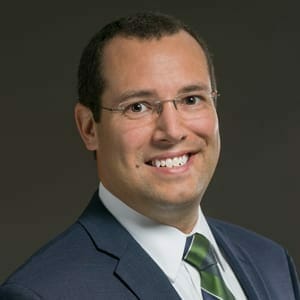
To find your talented next major gift officer, look beyond your borders and deepen your candidate pool by searching for non-traditional candidates who have the right combination of skills and personality traits to succeed. But also recognize that candidates who are new to university advancement or to higher education will need onboarding and support.
The recruitment and retention of our best talent in higher education is fraught with challenge. In institutional advancement, the average tenure of an MGO, by some estimates, is just above 18 months, levying a high cost on the institution in repeated searches, lost philanthropic momentum, and severed relationships. Not only is the length of tenure brief, the search costs to replace MGOs are high. Because the central pillar of successful fundraising is the relationship with the donor, and because each representative of the institution must establish credibility and trust with the donor before the best gift can be secured, replacing one MGO with another is not a simple plug-and-play process.
It’s a position — like many in higher education — that requires specific talent, and the competition for that talent is fierce. Recently, I recommended that leaders in advancement boost their odds of finding the right talent by broadening their hiring pool, searching for criteria beyond years of experience to find non-traditional candidates who have the right combination of skills and personality traits to be successful in your organization. Often, non-traditional candidates with transferable skills yield excellent MGOs.
Digging deeper into your candidate pool in this way presents a powerful opportunity — and new challenges, as well. When you do this, there are more talented people available to you…but you will need to be more intentional about how you hire, onboard, and support them. This is critical. Non-traditional candidates may arrive with passion and transferable skills, but the unique characteristics of an advancement operation in higher ed may take them surprise. They may be new to the work of institutional fundraising, or even to the culture and unique dynamics of a college or university environment. They will need training and development that your more traditional MGO hires didn’t. But that doesn’t mean they can’t have a powerful impact.
Hiring Beyond the Traditional Candidate Pool: Examples
To get started, explore your own personal interactions to find types of careers or classifications of professionals that demonstrate the philosophies and customer service that you seek. Consider recruiting relationship-builders from non-academic environments that recognize the value of customer retention year over year. Consider brand managers, communicators, pastors, lobbyists, etc. The task-based skills of advancement (lingo, ask arrays, integrations of academics, etc.) can be taught. The tougher skill set to find and develop is the ability to build relationships. Locate candidates who have transferable relationship development skills.
Some examples of successful non-traditional MGO candidates might include:
- Senior Pastor who is an alumnus of the institution:
- Likely Transferable Skills: relationship and volunteer engagement focused, and comfortable asking for money to support a mission in which they believe.
- Potential Growth Opportunities: Shifting from care of people to connecting people with opportunities to serve.
- Helpdesk Call Router from within the institution who is from the area, and has also completed an online degree from our institution:
- Likely Transferable Skills: not afraid to pick up the phone, comfortable with “no,” positive demeanor that translates through the phone.
- Potential Growth Opportunities: transitioning mindset from solving all problems to listening and encouraging engagement, length of conversation is a good thing.
- Lobbyist and Political Campaign Organizer from within the state, who graduated from an in-conference athletic rival:
- Likely Transferable Skills: identifying affinities and leveraging those connections into participation.
- Potential Growth Opportunity: recognition that the goal is lifelong engagement, not a 2-year election cycle in which new promises are made each time.
- Elected State Official for the district who knew the needs and pulse of the community:
- Likely Transferable Skills: identifying affinities and leveraging those connections into participation.
- Potential Growth Opportunity: recognition that the goal is lifelong engagement, not a 2-year election cycle in which new promises are made each time.
- University Director of Marketing, who already knew how to connect individuals’ passions to the mission:
- Likely Transferable Skills: communication of the value proposition for your institution.
- Potential Growth Opportunity: it is not only about telling the story, one has to also listen and connect the dots, providing an opportunity for the prospect to act.
- Bank Employee, who recognized the power of retaining current customers to grow the business:
- Likely Transferable Skills: ability to diffuse the typical discomfort when discussing financials with donors.
- Potential Growth Opportunity: recognition that higher education is not a business and is not typically a rapidly responding entity.
- Regional Blood Drive Coordinator, who understood giving, was comfortable working a territory, and building relationships:
- Likely Transferable Skills: comfort traveling a region and representing a mission-based philanthropic organization.
- Potential Growth Opportunity: understanding of the complexities within the organization and various gift models.
Each of these possessed a unique set of talents, and all were relatable, confident, approachable, and engaging; yet none of them had prior advancement experience, and some had no prior experience working at a college or university. You, too, can enrich and deepen your candidate pool by considering more criteria than simply years of experience. Your extra effort to find the non-traditional candidates who have the right combination of skills and personality traits to be successful in your organization will be rewarded.
Invest in Onboarding These New Hires, Too
In this way, you can sidestep the vigorous competition for seasoned MGOs, refine your hiring criteria to look at transferable skills rather than just years of experience, and build a more effective and diverse MGO team. But this approach is not without risk, and these new hires will thrive and stay only if you also invest in onboarding them. Once you have put in all the work of identifying and recruiting them, you need to also put in the work to ensure they are successful.
This is especially true for those non-traditional candidates who are new to higher education. They will need a crash course on the politics of the university environment, the way funding works, how decisions are made, the role of faculty, etc. This deep knowledge of the higher-education environment is a critical element to their success and will help them avoid a minefield of potential mistakes.
This year, Academic Impressions surveyed hundreds of new-to-higher-ed staff about their transition experience. We learned that their greatest surprises upon entering the sector were:
- The slowness of decision making and the frequent reliance on committees and consensus, the bureacracy and hierarchy of higher education, and the siloed manner in which departments operate.
- The politics, particularly the divide between administration and faculty.
- The risk aversion and resistance to change that is endemic in many departments.
- The lack of transparency around many processes and procedures or clear accountability.
- The language itself — the acronyms, the terminology, and the aversion to concepts and vocabulary from other sectors.
The higher-education environment is not like any other workplace, and new staff don’t just need to be able to talk with donors; they need to be able to work collaboratively with donor relations and annual fund professionals, prospectors, and faculty and department heads across your institution. So you will need to take an intentional and deliberate approach to hiring and onboarding these new professionals, so that they are able to understand deeply the higher-education context and hit the ground running.
But when you both hire non-traditional candidates and onboard them effectively, you will be rewarded with a diverse and high-performing MGO team.
____________________________________________________________________________
Image Credit: Photo above by Kyler Boone on Unsplash.
Read more from Dr. Joshua Jacobs: Recruiting the Right Major Gift Officers


